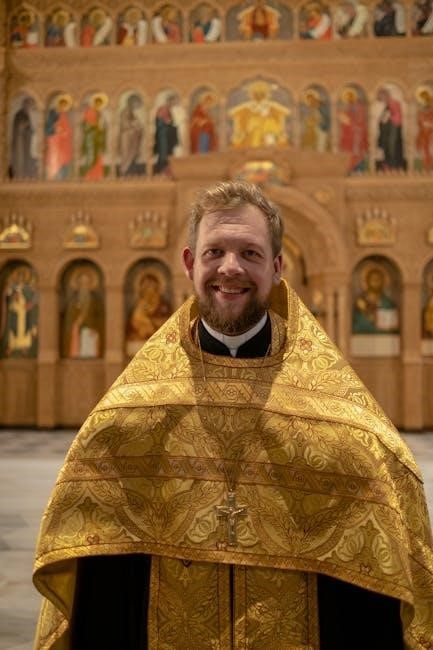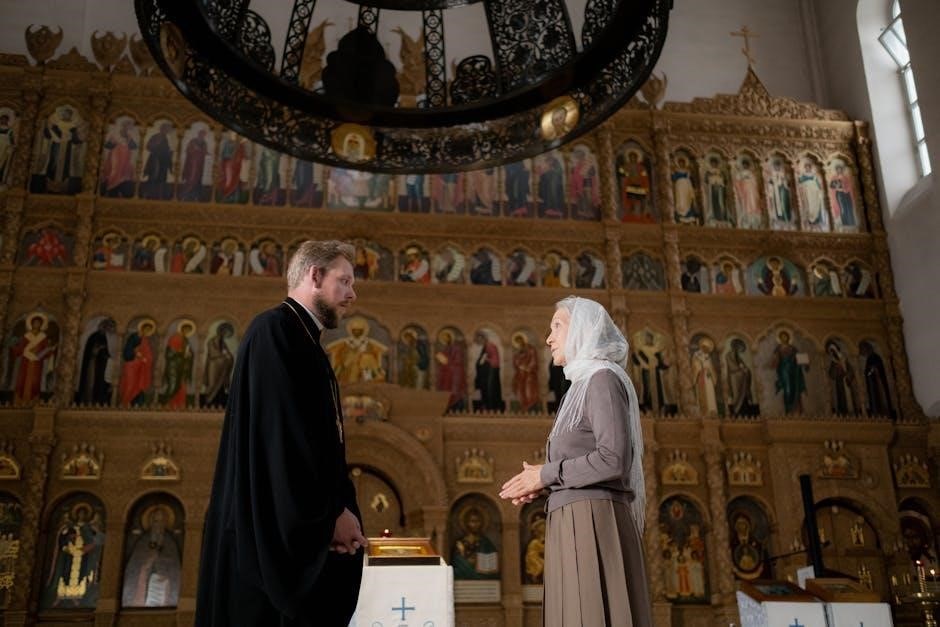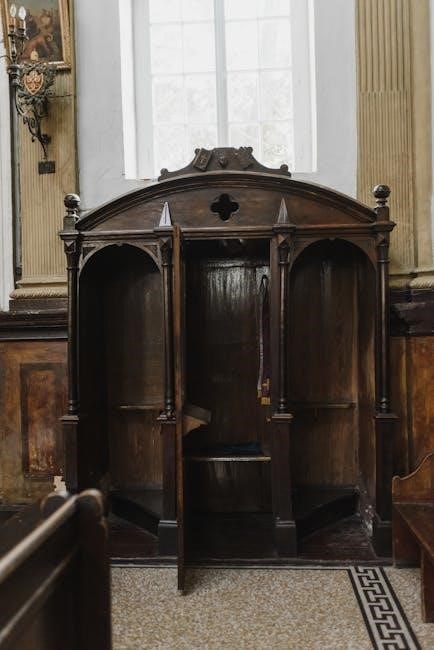
Orthodox Confession is a sacred sacrament where believers seek forgiveness for sins through repentance and prayer. It is a personal encounter with Christ, mediated by a priest.
This sacrament emphasizes spiritual growth, healing, and reconciliation with God and the Church. Rooted in Scripture and Tradition, it calls believers to humility, honesty, and transformation.
The Sacrament of Confession in the Orthodox Church
Confession is a sacred sacrament in the Orthodox Church, known as the Mystery of Repentance. It is a divine act where believers confess their sins to a priest, who acts as a spiritual guide and mediator of God’s forgiveness. This sacrament is rooted in Scripture and Tradition, emphasizing the importance of humility, honesty, and spiritual healing. Through confession, Orthodox Christians seek reconciliation with God and the Church, receiving grace to overcome sin and grow in holiness. The priest prays for the penitent, offering guidance and absolution, while the individual commits to amendment of life. Regular confession is encouraged for spiritual renewal.
The Role of the Priest in Confession
The priest in Orthodox confession acts as a spiritual father and mediator, facilitating reconciliation between the penitent and God. He does not forgive sins himself but serves as a vessel of God’s mercy. The priest listens with compassion, offers guidance, and provides spiritual advice. He prays for the penitent, imposing penances when necessary, such as prayer or fasting, to aid in spiritual healing. The priest also ensures confidentiality, as the seal of confession is sacred. His role is to help the believer understand their sins, renounce them, and return to a life of virtue and communion with God and the Church.
Why Confession is Important in Orthodox Life
Confession is a cornerstone of Orthodox spirituality, offering healing, reconciliation, and spiritual renewal. It allows believers to acknowledge their sins, seek forgiveness, and restore their relationship with God and the Church. Through confession, individuals confront their weaknesses, taking responsibility for their actions and committing to change. This sacrament fosters humility, fosters a deeper awareness of God’s mercy, and prepares one for Holy Communion. Regular confession strengthens faith, promotes personal growth, and nurtures a life of repentance and virtue, essential for walking the path to salvation and union with Christ.

Preparation for Holy Confession
Preparation involves self-examination, prayer, and fasting, helping believers recognize sins, repent sincerely, and seek spiritual guidance. It fosters humility, readiness to change, and openness to God’s grace.
Examining Your Conscience
Examining your conscience involves honest self-reflection, identifying sins, and acknowledging spiritual weaknesses. This process requires prayer, humility, and a willingness to confront your actions, thoughts, and omissions. Begin by reviewing your life in light of God’s commandments and the teachings of the Orthodox Church. Consider how you have loved God, others, and yourself. Reflect on specific areas, such as anger, greed, or dishonesty, and how they have impacted your relationships. This introspection helps you recognize patterns of sin and prepares you to confess sincerely, seeking forgiveness and healing. Regular self-examination strengthens your spiritual awareness and readiness for confession.
The Role of Prayer and Fasting in Preparation
Prayer and fasting are essential in preparing for Holy Confession, as they cultivate humility and repentance. Prayer helps to focus your mind and heart on God, seeking His guidance and mercy. Fasting, often recommended before confession, is a physical and spiritual act of self-denial, demonstrating your commitment to repentance. Both practices assist in quieting the soul, allowing for a deeper examination of conscience and a sincere confession. By combining prayer and fasting, you create a spiritual environment conducive to healing and reconciliation with God. These practices emphasize the seriousness of confession and your desire for spiritual renewal.
Seeking Guidance from Your Spiritual Father
Seeking guidance from your spiritual father is a vital part of preparing for confession. He offers wisdom, discernment, and encouragement, helping you understand your sins and struggles. A spiritual father provides personalized advice, prayer, and support, guiding you toward genuine repentance. Regular communication with him fosters humility and openness, essential for a meaningful confession. His role is not to judge but to help you grow spiritually. By seeking his counsel, you entrust your spiritual journey to an experienced guide, ensuring your confession is honest and fruitful. This relationship strengthens your resolve to live a life pleasing to God.

The Process of Confession
The process of confession involves acknowledging sins, expressing remorse, and receiving absolution. It is a sacramental encounter where believers seek forgiveness and spiritual healing through repentance.
The Physical Setup: Face-to-Face or Side-by-Side
In the Orthodox Church, confession typically occurs in an open area of the temple, often before an icon of Christ or the Theotokos. The penitent may stand face-to-face with the priest or side-by-side, depending on local tradition. This physical arrangement emphasizes the sacramental nature of confession, where the priest acts as a witness of repentance. Icons and the cross are present to remind the faithful of Christ’s mercy and the seriousness of the sacrament. The setup fosters a prayerful atmosphere, encouraging openness and humility. Both arrangements underscore the communal and ecclesiastical dimensions of confession.
How to Begin Your Confession
Begin your confession with prayer, asking for God’s mercy and guidance. Many start by reciting the Jesus Prayer or making the sign of the cross. Stand before the priest and humbly acknowledge your sins, saying, “Bless me, a sinner.” Be straightforward, avoiding excuses or justification. The priest may offer a brief prayer or blessing to set the tone. Confession should be approached with sincerity, focusing on specific thoughts, words, and actions that have distanced you from God. This openness fosters repentance and prepares you to receive spiritual guidance and absolution.
The Priest’s Role in Absolution
The priest acts as a witness and guide, not a judge, during absolution. After your confession, the priest offers a prayer asking for God’s forgiveness and mercy. They may provide spiritual guidance or penance to aid in your repentance. The priest pronounces absolution, declaring God’s forgiveness, which is sealed by the prayer and the laying on of hands. This sacramental act is a manifestation of Christ’s authority entrusted to the Church. The priest’s role is to mediate God’s grace, ensuring confidentiality and offering direction for spiritual growth. Their words of absolution are a source of comfort and renewal, reaffirming your reconciliation with God.
The Prayer of Absolution
The Prayer of Absolution is a sacred moment in Orthodox Confession, where the priest invokes God’s mercy and forgiveness. After the confession, the priest recites specific prayers, asking for the remission of sins. This prayer is not a magical formula but a heartfelt plea to God, rooted in the Church’s tradition. The priest prays for the penitent’s deliverance from sin and spiritual renewal. The prayer culminates in the declaration of forgiveness, emphasizing that it is God who pardons. This sacred act reaffirms the penitent’s reconciliation with God and strengthens their resolve to live a virtuous life.
What to Expect After Confession
After confessing, you can expect a profound sense of peace and renewal. The priest may offer words of encouragement, spiritual advice, or a prayer to seal your forgiveness. Many people feel a deep emotional and spiritual release, knowing their sins are forgiven. It is customary to prostrate or bow as a sign of gratitude. The priest may also assign a prayer or act of charity to strengthen your commitment to change. This moment is a renewal of your relationship with God, empowering you to live a more righteous life. The experience is deeply personal and transformative, fostering spiritual growth and humility.

Frequency and Timing of Confession
Regular confession is encouraged, with frequency varying based on spiritual needs and guidance from a spiritual father. It is customary before major feasts and Holy Communion.
How Often Should You Confess?
The frequency of confession varies depending on individual spiritual needs and guidance from a spiritual father. There is no strict rule, but many Orthodox Christians confess monthly or during major fasting periods. St; Basil the Great recommended confession for serious sins, while smaller struggles can be addressed through prayer and self-reflection. The key is to confess regularly enough to maintain spiritual health without falling into legalism. Some confess before receiving Holy Communion, especially on Sundays, while others may need more frequent confession due to specific life circumstances or struggles with sin. Ultimately, the goal is to seek spiritual growth and renewal.
Confession and Holy Communion
In the Orthodox Church, confession is closely tied to Holy Communion. Many believers confess before receiving Communion, especially on Sundays or during major feast days. This practice emphasizes the need for a clean heart and reconciliation with God before partaking of Christ’s Body and Blood. While there is no strict rule, frequent Communion often prompts regular confession to maintain spiritual preparedness. Ultimately, the frequency depends on personal spiritual guidance, ensuring that one approaches the sacraments with humility, repentance, and a desire for union with God.
What is a Life Confession?
A Life Confession is a profound and comprehensive sacramental confession in the Orthodox Church, typically undertaken at significant life junctures. It involves confessing all sins committed from childhood onward, ensuring no serious transgressions are unaddressed. Often performed before major life events, monastic tonsure, serious illness, or old age, it serves as a thorough cleansing of conscience. This practice underscores the importance of spiritual purity and prepares the individual for deeper union with God, emphasizing repentance and forgiveness. It differs from regular confessions by its scope and occasion, providing a complete accounting of one’s life before God.

Common Questions and Misconceptions
Explore frequent inquiries about Orthodox confession, such as its necessity, privacy concerns, and differences from other traditions, clarifying misunderstandings about this sacred practice.
Is Confession Mandatory for Orthodox Christians?
Confession is not legally mandatory but is highly recommended as part of Orthodox spiritual life. The Church encourages believers to confess regularly to maintain spiritual health and prepare for Holy Communion. While it is not enforced, frequent confession is seen as a vital practice for growth in humility, repentance, and closeness to God. Ultimately, the decision to confess lies with the individual, guided by their conscience and spiritual father. The Church emphasizes confession as a means of healing and reconciliation, rather than a strict obligation.
Can You Confess to a Priest You Don’t Regularly Commune With?
Yes, Orthodox Christians can confess to any priest, even if they do not regularly commune with him. The priest acts as a witness and guide in the sacrament, and confession is not dependent on familiarity. However, it is beneficial to have a regular spiritual father for consistency in spiritual growth. While any priest can hear confession, building a relationship with one priest allows for deeper guidance and accountability. Confidentiality is always maintained, ensuring comfort regardless of the priest. Ultimately, the choice depends on personal preference and circumstances, but regular confession is encouraged for spiritual well-being.
Is Confession Different from Other Christian Traditions?
Orthodox confession differs from other Christian traditions in its sacramental nature and emphasis on spiritual guidance. Unlike Protestant traditions, which often lack formal confession, Orthodoxy views it as a mystical sacrament. It also contrasts with Catholicism by not requiring prescribed penances and emphasizing the priest’s role as a spiritual father rather than a judge. The Orthodox Church’s focus on regular confession, preparation, and the sacrament’s connection to Holy Communion further distinguishes it. These unique aspects reflect the Orthodox understanding of repentance as a continuous process of healing and union with God, guided by the Church’s teachings and traditions.

Scripture and Tradition in Confession
The Orthodox Church upholds both Scripture and Tradition as inseparable sources of divine truth. Scripture provides the theological foundation, while Tradition offers practical guidelines for confession, ensuring a balanced approach to repentance and spiritual healing.
Biblical Basis for Confession
The Orthodox Church roots confession in biblical teachings. Jesus entrusted the disciples with the authority to forgive sins (John 20:21-23), establishing the sacrament’s foundation. James 5:16 encourages confessing sins to one another for healing, reflecting the communal aspect of repentance. The Bible emphasizes reconciliation with God and others, and confession serves as a means to achieve this. While Scripture doesn’t outline specific rituals, the Church developed confession as a sacrament based on these principles, ensuring a path to spiritual healing and restoration.

Patristic Teachings on Repentance
The Church Fathers emphasized repentance as a vital path to salvation. St. John Chrysostom taught that true repentance involves deep remorse, confession, and a firm resolve to amend one’s life. St. Basil the Great stressed that repentance is a divine gift, enabling believers to turn from sin to God. The Fathers also highlighted the importance of humility and tears in the repentance process, seeing them as signs of genuine contrition. Their writings underscored the priest’s role in guiding penitents and the healing power of confession, shaping the Orthodox understanding of repentance as both a personal and communal act of faith.
Liturgical Practices Surrounding Confession
In the Orthodox Church, confession is deeply intertwined with liturgical life. The rite of confession often occurs before the Divine Liturgy, emphasizing reconciliation before communion. The Prayer of Absolution, recited by the priest, is a solemn declaration of God’s forgiveness. Many parishes incorporate pre-confession prayers and hymns, creating a penitential atmosphere. Icons and crosses are venerated during confession, symbolizing the believer’s repentance and devotion. The liturgical setting underscores confession as a sacramental act, not merely a private conversation, connecting the individual’s repentance to the communal worship of the Church.
The Role of Icons and Prayer in Confession
Icons and prayer play a significant role in Orthodox confession, creating a sacred atmosphere for repentance. Icons of Christ, the Theotokos, and saints serve as reminders of God’s presence and the intercession of the holy. Prayer prepares the heart for confession, fostering humility and sincerity. Many faithful recite the Jesus Prayer or psalms before confessing, seeking spiritual clarity. The priest may also offer prayers during the confession, invoking God’s mercy. Icons and prayer help the believer focus on the spiritual dimensions of confession, emphasizing its divine character and the healing grace of God.

Personal Reflection and Growth
Confession fosters humility, self-examination, and a deeper connection with God. Through prayerful reflection, believers grow spiritually, embracing repentance and renewal, strengthening their faith journey.
How Confession Leads to Spiritual Growth
Confession nurtures spiritual growth by fostering honesty about sins and weaknesses, enabling believers to confront their failings humbly. Through this sacrament, individuals experience God’s mercy and grace, leading to healing and renewal. Absolution provides peace and strength, encouraging a commitment to change. By regularly confessing, Christians develop self-awareness and accountability, deepening their relationship with God. This process cultivates humility, repentance, and a desire to live according to God’s will, ultimately transforming the heart and guiding believers toward a more virtuous and meaningful life rooted in faith and love.
Overcoming Habitual Sins Through Confession
Confession is a powerful tool for breaking free from habitual sins, as it fosters self-awareness and accountability. By acknowledging recurring struggles, believers can confront sin patterns and seek divine grace for transformation. The sacrament provides an opportunity to repent sincerely, with the priest offering guidance and prayer for strength. Through confession, individuals receive forgiveness and the empowerment to resist sin, gradually cultivating spiritual freedom. Regular confession helps root out deep-seated weaknesses, enabling believers to grow in virtue and draw closer to God. This process of healing and renewal is essential for overcoming the cycles of sin and living a transformed life.
Cultivating Humility and Gratitude Post-Confession
After confession, believers are called to nurture humility and gratitude, recognizing the mercy of God and the gift of forgiveness. Humility grows through acknowledging one’s limitations and dependence on divine grace. Gratitude is expressed by thanking God for His compassion and the priest for their spiritual guidance. Prayer, reflection, and acts of kindness can deepen these virtues; By embracing humility, one avoids pride and self-justification, while gratitude fosters a heart of love and appreciation for God’s providence. These qualities enrich spiritual life, fostering a deeper connection with God and a life of continuous repentance and growth in holiness.

Practical Tips and Resources
Explore practical guidance for deepening your confession experience, including examining your conscience, prayer routines, and seeking advice from your spiritual father. Utilize recommended books, online guides, and community support to enhance your spiritual growth and embrace a life of repentance and humility.
Keeping a List of Sins for Confession
Keeping a list of sins is a common practice in Orthodox preparation for confession. Write down your sins as they occur to ensure honesty and thoroughness. Reflect on thoughts, words, and actions that contradict God’s commandments. This list is not for the priest but for personal accountability. Review it prayerfully before confession to identify patterns of sin. Maintain privacy and destroy the list afterward to protect confidentiality. This discipline fosters self-awareness and sincerity, helping you approach confession with a humble and repentant heart. Remember, the goal is spiritual growth, not merely a ritualistic exercise.
Prayers for Repentance and Forgiveness
Prayers for repentance and forgiveness are essential in preparing for confession. The Orthodox Church provides rich liturgical and devotional prayers to guide believers. The Jesus Prayer, “Lord Jesus Christ, have mercy on me,” is often recited to cultivate humility. Psalm 51, a penitential psalm, expresses deep sorrow for sin. Specific prayers like the “Prayer of St. Ephrem” and the “Canon of Repentance” are also used. These prayers help focus the mind, soften the heart, and express genuine remorse. Reciting them regularly fosters a spirit of repentance and readies the soul for confession. They remind us of God’s infinite mercy and our need for His grace.
Recommended Reading on Orthodox Confession
For a deeper understanding of Orthodox confession, several books are highly recommended. The Orthodox Church by Metropolitan Kallistos Ware provides an excellent overview of the sacrament. The Way of a Pilgrim offers practical insights into prayer and repentance. Preparation for Confession by Fr. John Mack is a helpful guide for laypeople. Additionally, Confession: A Series of Lectures by Fr. Thomas Hopko explores the theological and practical aspects of confession. Reading these works enriches one’s understanding of the sacrament and its role in spiritual life, offering both theological depth and practical advice for believers seeking to grow in faith and humility.
Online Resources and Guides
Several online resources provide invaluable guidance for Orthodox confession. The Orthodox Church in America (OCA) website offers detailed articles and preparation guides. The Greek Orthodox Archdiocese of America shares insightful resources on the sacrament. Websites like Ancient Faith Ministries and OrthodoxWiki provide accessible explanations and prayerful reflections. Additionally, many Orthodox parishes publish confession guides tailored for their communities. These online tools, including podcasts and YouTube channels, help believers deepen their understanding of confession and prepare meaningfully for the sacrament. Utilizing these resources fosters a more informed and prayerful approach to repentance and spiritual growth.

Cultural and Historical Perspectives
Orthodox confession reflects rich cultural and historical traditions. Practices vary across ethnic churches, blending local customs with universal teachings. Historically, confession evolved from early Church practices, emphasizing continuity and adaptation across centuries.
Confession in Different Orthodox Cultures
Orthodox confession practices vary subtly across cultures, reflecting local traditions while maintaining theological unity. In Greek Orthodox traditions, confession often occurs face-to-face, emphasizing a personal encounter. Russian Orthodox practices frequently use a screen or icon separating the penitent and priest, symbolizing Christ’s mediation. Slavic traditions may incorporate veneration of icons during confession, while Middle Eastern Orthodox churches blend Arab hospitality with sacramental solemnity. These cultural expressions enrich the sacrament, highlighting the universal call to repentance within diverse communal contexts, yet always preserving the essence of spiritual healing and reconciliation.
Historical Development of Confession in the Orthodox Church
The sacrament of confession in the Orthodox Church traces its roots to the early Christian Church, where public confession was common. Over time, confession evolved into a private practice between the believer and the priest, formalized by the 7th to 10th centuries. The priest’s role as a spiritual guide became central, emphasizing repentance and healing. By the 10th century, confession was fully established as a sacrament, with the priest acting as a mediator of God’s forgiveness. This development reflected the Church’s understanding of confession as a means of spiritual renewal and restoration, deeply intertwined with the sacramental life of the Orthodox faith.
Notable Historical Documents on Confession
Key historical documents shaping the Orthodox understanding of confession include the works of early Church Fathers like St. John Chrysostom and St. Basil the Great, who emphasized repentance and the priest’s role. The Canons of the Holy Apostles and the Rudder (a collection of ecclesiastical decrees) provide foundational guidelines. The Confession of Dositheus (1672) from the Synod of Jerusalem reaffirmed Orthodox teachings on confession. These documents highlight the sacrament’s role in spiritual life, balancing public and private confession, and guiding both clergy and laity in the pursuit of repentance and divine forgiveness.
Confession is a transformative sacrament fostering spiritual growth, healing, and reconciliation with God. Regular participation leads to deeper humility, self-awareness, and a life of repentance. Embrace it with honesty and humility to draw closer to Christ and experience divine forgiveness.
Final Thoughts on the Importance of Confession
Confession is a profound expression of faith, offering believers a sacred opportunity to seek healing, forgiveness, and spiritual renewal. By acknowledging our weaknesses and sins, we open ourselves to God’s grace and mercy. This sacrament strengthens our relationship with Christ, fostering humility, self-reflection, and personal growth. Regular confession cultivates a deeper awareness of our actions and their impact on our spiritual journey. It is a powerful tool for overcoming sin and drawing closer to God. Embrace confession as a lifeline to spiritual health, and approach it with sincerity, trusting in God’s boundless love and forgiveness.
Encouragement to Engage in Regular Confession
Embracing regular confession is a transformative practice that nurtures spiritual health and deepens your faith. By confessing regularly, you cultivate self-awareness, accountability, and a humble heart. It becomes a powerful rhythm of repentance and renewal, allowing you to grow closer to God and live a life aligned with His will. Don’t wait until major sins accumulate—consistent confession helps address smaller struggles before they become overwhelming. Make it a priority to seek this sacrament often, trusting in its power to heal and transform your life. Let regular confession be a cornerstone of your spiritual journey, guiding you toward eternal salvation.